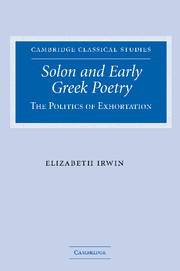Book contents
- Frontmatter
- Contents
- Acknowledgements
- List of abbreviations and editions
- Introduction
- PART I THE POLITICS OF EXHORTATION
- Introduction
- 1 Understanding the political in martial exhortation elegy
- 2 Synthesising content and context
- 3 Contextualising the city: archaic verse inscriptions and the ‘rise’ of the polis
- PART II POLITICAL POETICS: SOLON'S EUNOMIA
- PART III POETRY AND POLITICAL CULTURE
- Conclusion
- Appendix I Who were Tyrtaeus' gymnetes?
- Appendix II λυκάβαντος: when the wolf comes?
- Bibliography
- General index
- Index locorum
3 - Contextualising the city: archaic verse inscriptions and the ‘rise’ of the polis
Published online by Cambridge University Press: 05 November 2009
- Frontmatter
- Contents
- Acknowledgements
- List of abbreviations and editions
- Introduction
- PART I THE POLITICS OF EXHORTATION
- Introduction
- 1 Understanding the political in martial exhortation elegy
- 2 Synthesising content and context
- 3 Contextualising the city: archaic verse inscriptions and the ‘rise’ of the polis
- PART II POLITICAL POETICS: SOLON'S EUNOMIA
- PART III POETRY AND POLITICAL CULTURE
- Conclusion
- Appendix I Who were Tyrtaeus' gymnetes?
- Appendix II λυκάβαντος: when the wolf comes?
- Bibliography
- General index
- Index locorum
Summary
A fundamental premise of my approach to martial elegy is that the content of this poetry needs to be considered in combination with its performance context in order to assess its meaning and contribution to social and historical discussions. If this premise is valid, then it should be illuminating to examine another form of elegy – another form of heroicising verse – which participates in a different context: that is, the genre of archaic verse inscriptions. The questions this chapter addresses are these: what light does the inscribed archaic epigram shed on the function of context in determining the meaning of its content; and can the combined consideration of sympotic and epigraphic verse, particularly epigrams involving the theme of death in war, clarify our understanding of aristocratic attitudes towards the archaic city? I explore these issues by looking at the stones that exhibit the greatest similarity to martial exhortation elegy, inscriptions for dead warriors. I then examine the wider genre of archaic epigram for expressions about the city, and conclude by proposing an explanation for the observations contained in this chapter.
Methodological points
Certain differences in the genres of archaic sympotic and epigraphic verse suggest that their comparison would be desirable in a discussion of how the context – one might say for both genres the ‘performance’ context – of poetry contributes to its meaning. First, the fixed outdoor, always potentially public, setting of an inscribed monument stands in contrast to the private performance space of the symposium.
- Type
- Chapter
- Information
- Solon and Early Greek PoetryThe Politics of Exhortation, pp. 63 - 82Publisher: Cambridge University PressPrint publication year: 2005



